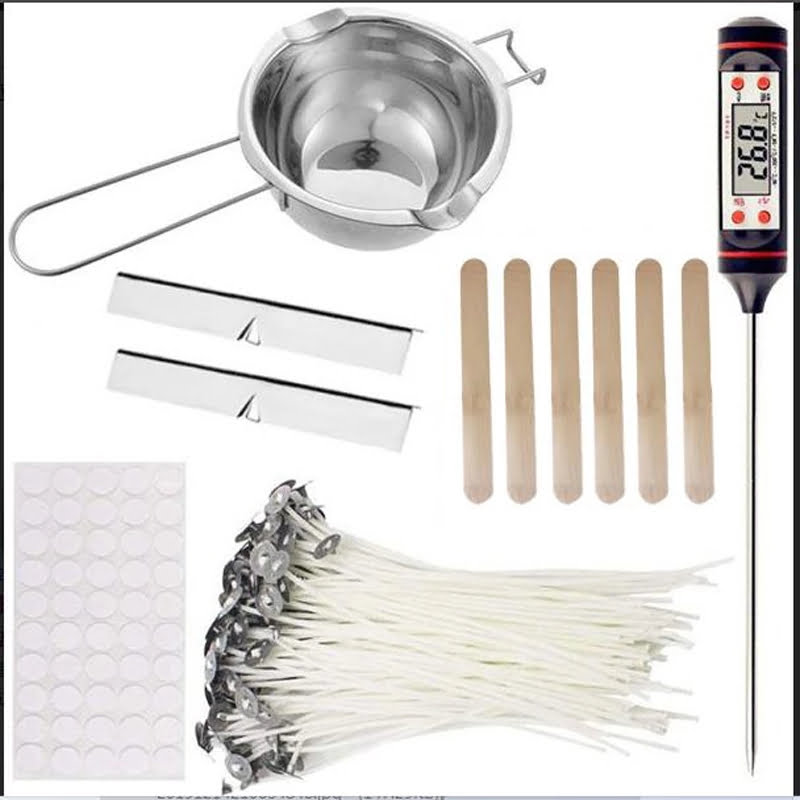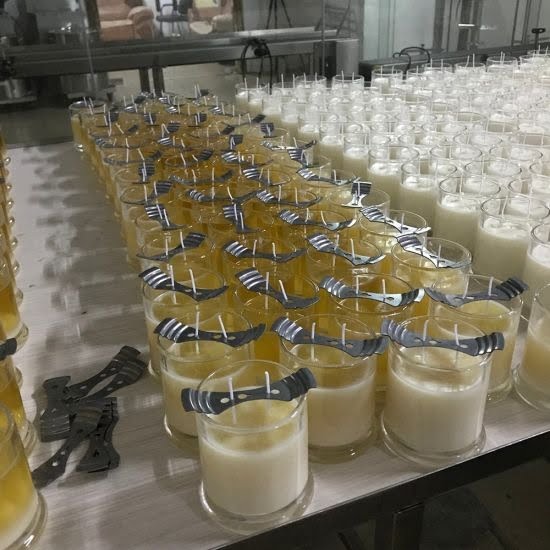Candle making is a popular hobby and business venture that continues to grow in popularity. Whether you are a seasoned candle maker or just starting out, it is important to consider the risks involved in this craft and take necessary precautions to protect your business.
One such precaution is obtaining candle making insurance. In this article, we will explore the importance of candle making insurance, the factors that determine its cost, the benefits and coverage it offers, as well as different types of policies available for candle makers.
When it comes to candle making, there are several risks involved that could potentially lead to financial loss or legal action. Accidents such as fires, property damage, and bodily injury can occur at any time during the production process or even after the candles have been sold. Without proper insurance coverage, these incidents could leave you facing significant financial burdens that may be difficult to recover from.
The cost of candle making insurance can vary depending on several factors. These include the size of your business, your annual revenue, the types of candles you produce, your location, and any previous claims history you may have. It’s important to understand these factors and how they contribute to the overall cost so that you can budget accordingly and ensure adequate coverage for your specific needs.
Understanding the Risks Involved in Candle Making
Candle making may seem like a harmless hobby or business venture, but there are actually several risks involved in this industry. Understanding these risks is crucial for candle makers to ensure they have the appropriate insurance coverage to protect themselves and their businesses.
One of the main risks in candle making is the potential for fire hazards. The process of melting wax and working with open flames poses a significant risk of accidental fires. A small spark or a momentary lapse in attention can quickly lead to a dangerous situation. In addition, if candles are not properly extinguished, they can continue burning and potentially cause a fire when left unattended.
Another risk in candle making is related to product liability. Although candles are commonly used for decorative purposes or relaxation, they are still considered products that consumers use in their homes. If a candle were to malfunction or cause harm due to defects, such as faulty wicks or unstable containers, it could result in injuries or property damage. Product liability claims can be costly and can have severe consequences for candle makers.
Furthermore, there is also a risk of health hazards associated with certain ingredients used in candle making. Some fragrances or dyes may contain chemicals that can trigger allergies or respiratory problems in individuals who come into contact with the candles. This can result in potential claims for bodily injury caused by exposure to these substances.
To mitigate these risks and protect their businesses from financial losses, it is important for candle makers to obtain appropriate insurance coverage. Candle making insurance typically includes general liability coverage that protects against claims related to bodily injury, property damage, and product liability. It may also include coverage for business property, equipment breakdowns, and business interruption.
Factors That Determine the Cost of Candle Making Insurance
When considering candle making insurance, one of the most important factors to take into account is the cost. The price of insurance coverage for your candle making business can vary depending on several key factors. Understanding these factors and how they contribute to the overall cost can help you make informed decisions when selecting an insurance policy.
Type and Size of Business
The type and size of your candle making business play a significant role in determining the cost of insurance coverage. Larger businesses with higher amounts of inventory, equipment, and revenue may require higher coverage limits, resulting in higher premiums. Additionally, if you operate a retail shop or have employees, you may need additional coverage such as general liability or workers’ compensation, which can also increase the cost.
Risk Assessment
Insurance companies assess the risk associated with your candle making business when determining the cost of coverage. Factors such as the materials used in candle making (e.g., flammable oils or dyes), manufacturing processes involved, and any past incidences or claims can impact the premium rates. If your business has a history of accidents or safety concerns, it may result in higher premiums since insurers consider it as a greater risk to insure.
Coverage Limits and Deductibles
The specific coverage limits and deductibles you choose for your candle making insurance policy can also affect its cost. Higher coverage limits provide more protection but generally come with higher premium rates. Similarly, lower deductibles result in less out-of-pocket expenses after a claim but typically lead to higher premiums. Finding the right balance between adequate coverage and affordable premiums is essential for managing costs while ensuring sufficient protection.
Benefits and Coverage Offered by Candle Making Insurance
Candle making insurance offers a range of benefits and coverage options to protect candle makers from potential risks and liabilities. This section will examine some of the key benefits and types of coverage that are typically offered by candle making insurance providers.
Liability Coverage
One of the most important aspects of candle making insurance is liability coverage. This type of coverage protects candle makers in the event that their products cause harm or damage to customers or their property. For example, if a customer suffers an allergic reaction to a scented candle, liability coverage would help cover any medical expenses or legal fees that may arise from a lawsuit.
Product Liability Coverage
Product liability coverage is specifically designed to protect candle makers from claims related to product defects or injuries caused by their candles. This can include situations such as a faulty wick causing a fire or burns, or if a customer claims that the product was not as advertised. Product liability coverage helps cover legal fees, settlements, and judgments associated with these claims.
Property Coverage
In addition to liability coverage, many candle making insurance policies also offer property coverage. This covers physical assets such as equipment, inventory, and supplies used in the candle making business. In the event of theft, fire, storm damage, or other covered perils, property coverage helps reimburse the insured for repairs or replacement costs.
Cancellation and Business Interruption Coverage
Candle making insurance often includes coverage for business interruption due to unforeseen circumstances. This can include events such as natural disasters where the business has to temporarily shut down or relocate. Cancellation coverage may also be included to protect against financial losses incurred from canceled events or orders.
Overall, candle making insurance provides essential protection for businesses in this industry by offering comprehensive coverage against a range of potential risks and liabilities. It is important for candle makers to carefully review different policies and coverage options to find the one that best fits their specific needs and budget.
Examining Different Types of Policies for Candle Makers
Candle makers face unique risks in their business, and it is essential for them to have the appropriate insurance coverage to protect themselves and their businesses. There are different types of policies available specifically tailored for candle makers. Understanding these policies will help candle makers make an informed decision about the coverage they need.
One common type of insurance policy for candle makers is general liability insurance. This type of policy provides coverage for bodily injury or property damage claims that may arise as a result of your candle making business operations. For example, if a customer slips and falls in your shop and gets injured, general liability insurance can help cover their medical expenses.
Product liability insurance is another important policy for candle makers. It offers protection in case a candle you produce causes harm to someone or damages their property. This could include situations where a defective candle causes a fire or injuries due to toxic substances used in the manufacturing process. Product liability insurance would provide coverage for legal defense costs, settlements, or judgments.
In addition to these two fundamental policies, there are other types of coverage that can be beneficial for candle makers depending on their specific needs. These may include property insurance, which protects against loss or damage to your physical assets such as equipment or inventory, and business interruption insurance which covers lost income if your operations are temporarily halted due to a covered event like a fire or natural disaster.
As you examine different types of policies for candle making insurance, it is important to evaluate your unique needs and consider factors such as the size of your business, the scope of your operations, and the specific risks you face. Working with an experienced insurance provider who specializes in serving candle makers can be helpful in determining the right combination of policies that offer adequate coverage for your business needs.
Step-by-Step Guide
Obtaining candle making insurance is essential to protect yourself and your business from potential risks and liabilities. Here is a step-by-step guide on how to obtain candle making insurance:
Step 1: Assess Your Insurance Needs
Before diving into the process of obtaining candle making insurance, it is important to assess your specific insurance needs. Consider factors such as the size of your business, the types of products you offer, and any unique risks associated with your candle making process. This will help you determine the appropriate coverage limits and types of policies you should be looking for.
Step 2: Research Insurance Providers
Once you have a clear understanding of your insurance needs, it’s time to research different insurance providers that offer coverage for candle making businesses. Look for providers who specialize in small businesses or craft industries as they are likely to have tailored policies that meet your unique requirements. Seek recommendations from fellow candle makers or industry associations to find reputable providers.
Step 3: Compare Coverage Options and Pricing
After narrowing down a list of potential insurance providers, compare their coverage options and pricing. Pay attention to the specific coverage offered, including general liability, product liability, property damage coverage, and business interruption insurance. Consider both the breadth of coverage and policy limits when comparing options.
Step 4: Contact Insurance Providers for Quotes
Reach out directly to the insurance providers you are interested in and request quotes based on your specific needs. Be prepared to provide detailed information about your business operations, including revenue projections and past claims history if applicable. This will help ensure that you receive accurate quotes tailored to your business.
Step 5: Review Policies Carefully
Once you receive quotes from different providers, take the time to carefully review each policy offer. Pay attention to policy exclusions, deductibles, and any additional terms or conditions that may apply. If there are any aspects that you are unsure about, don’t hesitate to ask questions or seek clarification from the insurance provider.
Step 6: Make an Informed Decision
After reviewing and comparing the policies, it’s time to make a final decision. Choose the insurance provider that offers the best coverage options and pricing for your specific needs. Once you have made your decision, contact the chosen provider to complete the necessary paperwork and finalize your candle making insurance coverage.
By following this step-by-step guide, you can ensure that you obtain appropriate insurance coverage for your candle making business. Remember, while it may be tempting to skip out on insurance to save costs, the financial protection and peace of mind it provides far outweighs any upfront expenses. Safeguard your business today with candle making insurance.
Researching and Comparing Insurance Providers for Candle Making
Researching and comparing insurance providers for candle making is a crucial step in obtaining the right coverage for your business. With numerous insurers in the market, it is important to take the time to research and compare different options before making a decision. This section will guide you through the process of researching and comparing insurance providers so that you can make an informed choice.
Identify Your Insurance Needs
Before diving into researching insurance providers, it’s important to first determine your specific insurance needs as a candle maker. Consider factors such as the size of your business, the types of products you sell, whether you have employees or work from home, and any particular risks associated with your operations. Understanding your needs will help you narrow down the list of potential insurance providers.
Gather Recommendations and Referrals
One way to start your research is by gathering recommendations and referrals from other candle makers or industry professionals. Reach out to fellow entrepreneurs in your network or join online forums and communities dedicated to candle making. Ask for their experiences with different insurance providers and if they have any recommendations. Referrals can provide valuable insights based on real-life experiences, helping you find reliable insurance companies that understand the unique risks faced by candle makers.
Conduct Online Research
The internet is a powerful tool for gathering information about insurance providers. Visit websites of various insurance companies that offer coverage for small businesses or specifically mention candle making insurance in their offerings. Take note of their experience in the industry, customer reviews and ratings, coverage options provided, claims process, pricing details, and any additional services they offer. Look for independent review websites or forums where customers share their experiences with different insurers.
Compare Coverage Options and Pricing
Once you have narrowed down a list of potential insurance providers, carefully compare the coverage options and pricing offered by each company. Consider the specific coverage requirements for your candle making business, such as general liability insurance, product liability insurance, property insurance, or business interruption insurance. Compare the policy limits, deductibles, and exclusions to ensure that the coverage meets your needs.
Additionally, obtain quotes from multiple insurers to get a sense of the pricing differences. Keep in mind that while cost is important, it should not be the sole factor in your decision-making process.
Evaluate Customer Service and Claims Process
In addition to coverage options and pricing, it’s important to consider the customer service and claims process offered by different insurance providers. Look for insurers that have a reputation for excellent customer service and prompt claims handling.
Consider factors such as response times, ease of filing claims, availability of support channels such as phone or email, and any additional resources or tools they provide to their policyholders. A reliable insurer will be there to support you throughout any potential claims or incidents that may arise in your candle making business.
By following these steps and conducting thorough research and comparisons, you can find an insurance provider that meets your specific candle making needs. Remember to review your chosen insurer periodically to ensure that their coverage continues to align with your evolving business requirements.
Expert Tips for Saving Money on Candle Making Insurance
Expert Tips for Saving Money on Candle Making Insurance
While candle making insurance is important for protecting your business, it doesn’t have to break the bank. There are several expert tips you can follow to save money on your insurance coverage while still ensuring that you have adequate protection.
Shop Around and Compare Quotes
One of the most effective ways to save money on candle making insurance is to shop around and compare quotes from different insurance providers. Each provider may calculate premiums differently, so it’s important to get multiple quotes before settling on a policy. Make sure to carefully review the coverage offered by each provider and consider factors such as deductibles, limits, and exclusions.
Bundle Your Policies
If you already have other types of business insurance, such as general liability or property insurance, bundling your policies with the same provider can lead to significant savings. Many insurance companies offer discounts for bundling multiple policies together, so make sure to inquire about this option when obtaining quotes.
Implement Risk Management Practices
Insurance providers assess risk when determining premiums, so taking steps to minimize risk in your candle making business can help lower your rates. This can include implementing safety protocols, properly training employees in handling materials and equipment, and regularly maintaining equipment to prevent accidents or damages.
| Tips for Saving Money on Candle Making Insurance |
|---|
| Shop Around and Compare Quotes |
| Bundle Your Policies |
| Implement Risk Management Practices |
By following these expert tips, candle makers can save money on their insurance while still ensuring that they have appropriate coverage. Remember, it’s important to regularly review your insurance policy and make adjustments as necessary to adequately protect your business.
Case Studies
One of the best ways to understand the importance and benefits of candle making insurance is by examining real-life examples of candle makers who have benefitted from having appropriate insurance coverage. These case studies provide valuable insights into the risks involved in candle making and how insurance can protect a business from financial losses.
Example 1: Sarah’s Candle Co.
Sarah is a small-scale candle maker who operates her business out of her home studio. She takes pride in creating unique and high-quality candles. One day, while pouring hot wax into molds, Sarah accidentally knocked over a nearby container of fragrance oil. The oil spilled onto an open flame, causing a fire that damaged not only her studio but also some neighboring properties.
Fortunately, Sarah had comprehensive candle making insurance that covered both her property damage and liability for the neighboring properties. The insurance policy also provided coverage for temporary relocation expenses while her studio was being repaired. Without this coverage, Sarah would have faced significant financial burdens and potential legal action from the affected neighbors.
Example 2: Jackson’s Candles Emporium
Jackson owns a successful retail store that specializes in selling various types of candles made by local artisans. One day, one of Jackson’s customers experienced an allergic reaction to a scented candle’s fragrance ingredients and suffered severe respiratory distress. The customer filed a lawsuit against Jackson’s store, claiming damages for medical expenses and emotional distress.
Luckily, Jackson had product liability insurance specifically tailored for his retail business. The insurance policy protected him against such claims related to products sold by his store. It covered legal defense costs as well as any settlements or judgments awarded against him. This protection ensured that Jackson’s business could continue operating smoothly without crippling financial setbacks.
| Case Study | Outcome |
|---|---|
| Sarah’s Candle Co. | Comprehensive coverage for property damage, liability, and temporary relocation expenses |
| Jackson’s Candles Emporium | Protection against product liability claims, including legal defense costs and settlements |
Frequently Asked Questions about Candle Making Insurance
Candle making insurance can be confusing for many people, especially those who are new to the candle making industry. To help clarify some common questions and concerns, here are a few frequently asked questions about candle making insurance:
- What is candle making insurance?
- Why do I need candle making insurance?
- How much does candle making insurance cost?
Candle making insurance is a specific type of business insurance that is designed to protect individuals or businesses against potential risks and liabilities associated with candle making. This type of insurance typically provides coverage for property damage, product liability, general liability, and other risks specific to the candle making industry.
Candle makers face unique risks and challenges in their business operations. From potential fire hazards during the manufacturing process to product liability claims if a customer is injured or their property is damaged by a faulty candle, there are various risks involved in this industry. Candle making insurance provides financial protection and peace of mind in the event that unexpected incidents or accidents occur.
The cost of candle making insurance can vary depending on several factors. Some of the key factors that may influence the cost include the size of your business, the value of your assets, your annual revenue, the types of products you sell, and your location. Additionally, the level of coverage and any additional endorsements or riders can also impact the cost.
| Frequently Asked Questions |
|---|
| What is candle making insurance? |
| Why do I need candle making insurance? |
| How much does candle making insurance cost? |
By understanding these frequently asked questions about candle making insurance, individuals in the industry can make informed decisions when it comes to protecting their business and mitigating potential risks. It is recommended that candle makers consult with insurance providers to get personalized quotes and coverage options based on their specific needs and circumstances.
Conclusion
In conclusion, candle making insurance is a crucial investment for anyone running a candle making business. While there are inherent risks involved in the candle making process, having the right insurance coverage can provide peace of mind and protect your business from potential financial losses.
Understanding the factors that determine the cost of candle making insurance is important in order to obtain the most appropriate coverage at a reasonable price. Factors such as the size of your operation, the number of employees you have, and the types of candles you produce will all influence the cost of your insurance premium.
One of the main benefits of candle making insurance is that it provides coverage for a wide range of risks, including product liability, property damage, and even loss or theft of inventory. By having adequate coverage in place, you can rest assured knowing that your business is protected from these unforeseen events.
When obtaining candle making insurance, it is important to research and compare different providers to find one that offers comprehensive coverage at a competitive price. Additionally, taking steps to mitigate risks in your candle making process can help reduce your insurance costs. By implementing safety protocols and maintaining a clean and organized workspace, you may be eligible for discounts on your premiums.
In summary, investing in appropriate insurance coverage for your candle making business is essential for protecting yourself against potential losses and liabilities. By understanding the risks involved, comparing different policy options, and implementing safety measures to reduce risk exposure, you can secure comprehensive coverage at an affordable price. Don’t wait until it’s too late – protect your candle making business with proper insurance today.
Frequently Asked Questions
What insurance does a candle maker need?
A candle maker typically needs several types of insurance to protect their business. First and foremost, they need product liability insurance to cover any claims that may arise if a customer is harmed or their property is damaged due to a defect in the candles. This is important because accidents can happen, and even with rigorous quality control measures, there is always a small chance that some candles may be faulty.
Additionally, they should consider getting general liability insurance, which provides coverage for third-party bodily injury or property damage claims that may occur on the premises of the business. Property insurance is also crucial to protect against fire, theft, or other physical damages to their business property and inventory.
How much is candle maker insurance?
The cost of candle maker insurance can vary depending on various factors such as the size of the business, revenue, location, coverage limits needed, and past claims history. Generally speaking, though, the annual premium for candle maker insurance can range from a few hundred dollars to several thousand dollars depending on these factors.
It’s essential for candle makers to obtain quotes from different insurers and compare policies to ensure they are getting adequate coverage at the most competitive rates.
Why do I need insurance to sell candles?
Insurance is necessary for those selling candles because it helps protect them from financial loss in case something goes wrong during their operations. When selling candles, there’s always a risk that customers could experience allergic reactions or injuries due to burns or accidents caused by faulty products. If someone were to file a lawsuit against the candle seller claiming negligence or harm caused by their candles, not having insurance in place could lead to significant expenses that could potentially bankrupt a small business owner.
Having insurance provides peace of mind by transferring some of these risks away from the candle seller and onto an insurer who will handle potential legal costs and settlements resulting from such claims. Additionally, many retailers require businesses they work with to have appropriate insurance coverage as part of their contractual agreements in order to mitigate potential liabilities for themselves as well.

Welcome to my candle making blog! In this blog, I will be sharing my tips and tricks for making candles. I will also be sharing some of my favorite recipes.





